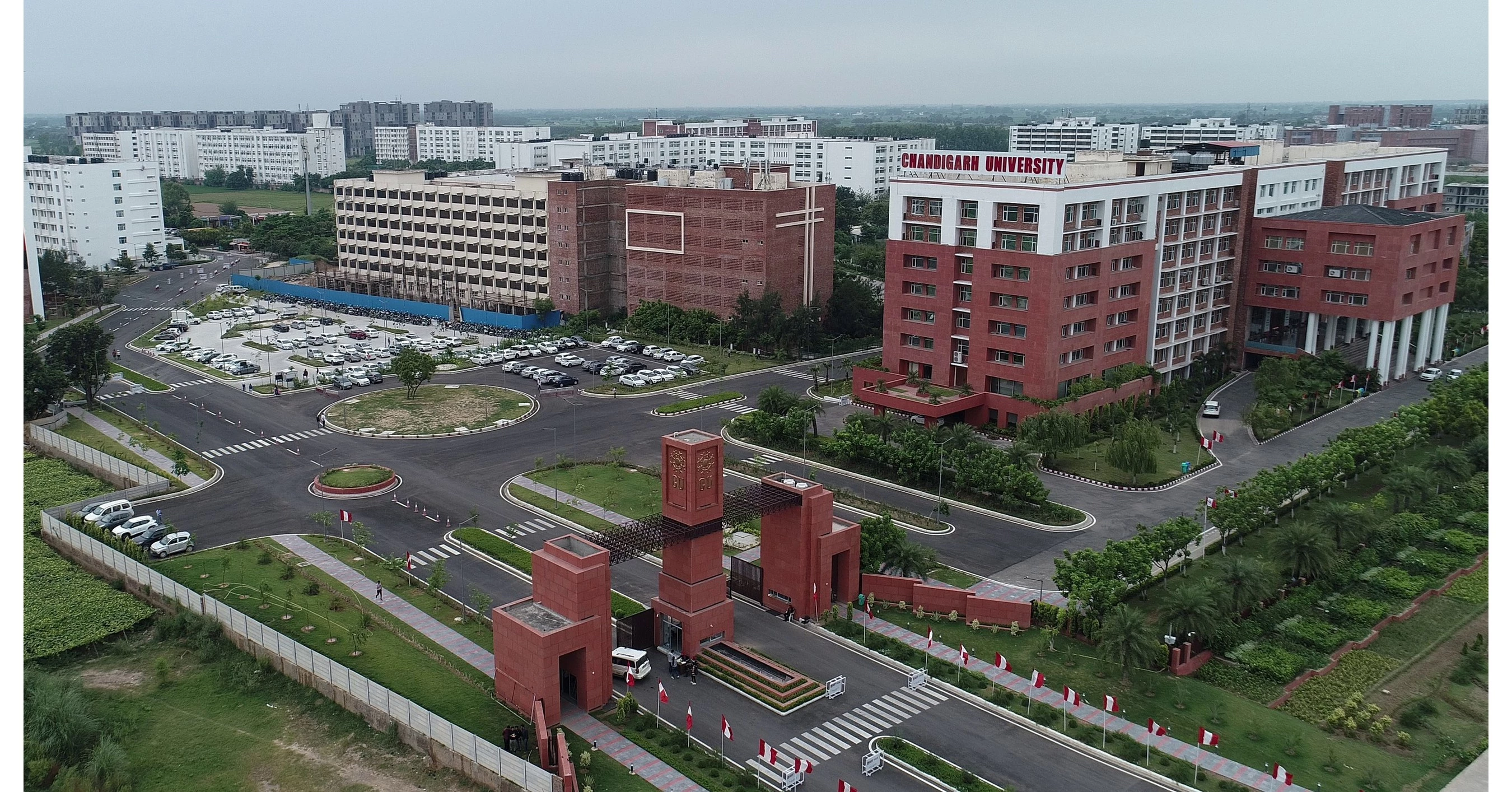Food supply chains around the world are changing due to consumer demand for packaged, sanitary, and ecological food. By 2050, it is expected that there will be more than 9.7 billion people on the planet, which would significantly increase need for qualified experts who can effectively and precisely manage food systems.
Rapid urbanization, rising health consciousness, and shifting consumption habits are all contributing factors to India's food processing industry's projected $535 billion by 2025.
Despite being one of the top producers of milk, grains, fruits, and vegetables, India value-adds less than10 percent of its produce. This untapped segment presents a major opportunity. Government support, infrastructure investments, and favourable policies are building a strong case for food technology as a growth-intensive career.
Chandigarh University’s BTech Food Technology program is structured to develop engineers capable of solving challenges in food production, safety, packaging, and innovation.

What is Food Technology Engineering and Its Core Functions
Food Technology is an applied science field that uses chemistry, biology, engineering, and nutrition. The main goal is to produce safe and high-quality goods on a large scale from raw food ingredients.
Core Functions in Food Technology
Function | Description |
Food Processing | Uses mechanical and thermal processes to transform raw ingredients into food that is ready to be stored. |
Food Preservation | Uses methods like dehydration, cooling, and chemicals to increase shelf life. |
Food Packaging | Designs packaging to maintain hygiene and prevent contamination |
Quality Control | Implements testing protocols to meet food safety and compliance benchmarks |
Food Safety | Eliminates contamination risk and ensures public health standards |
The food technology domain is operationally based on these functions. They respond to consumer demand, comply with national and global regulatory systems, and help ensure large-scale distribution without compromising safety.
Importance of Food Technology Engineering in the Current Market
Indian Food Sector Growth Rate
India’s food industry is scaling fast. The expansion of ready-to-eat and processed food markets has created a rising need for technically trained professionals. Job creation is also being driven by government investments in agro-processing units and industrial clusters.
Government Schemes and FDI Policy
The sector is supported by national initiatives like the PLISFPI scheme, PMFME, and Operation Greens. In the food industry, these are directly supporting startup funding and production scale-ups. The 100 percent FDI allowance in food processing is bringing international players into the Indian market, increasing demand for regulatory and compliance-ready talent.
International Relevance
Food engineering professionals are in demand in global markets, including the US, Europe, and Southeast Asia. International food regulations and traceability systems must be followed by industries that focus on exporting.
Interdisciplinary Scope
The skills acquired through food technology training are relevant across packaging, pharmaceuticals, biotechnology, hospitality, and public health.
Technological Integration
Smart automation, industrial robotics, and AI-led food simulations are disrupting traditional production lines. These technology-trained engineers are highly sought after for their inventiveness and efficiency gains.
Overview of the BTech Food Technology Course at Chandigarh University
Chandigarh University’s BTech Food Technology program is a four-year full-time degree approved by AICTE. It combines scientific theory with engineering processes and offers direct exposure to live projects, certifications, and industry mentoring.
Program Features of BTech Food Technology at CU
- AI courses that include Microsoft certifications in Azure Data Fundamentals and Azure AI
- Training approved by the industry from Nestle, Amul, PepsiCo, and Parle
- Access to testing facilities, instrumentation centers, and process labs
- Choice-based education including electives in waste management, biotechnology, and sugar processing
- Programs for studying abroad offered by more than 500 international partner colleges
- Accredited by NBA and ABET for international academic recognition
Key Subjects in the BTech Food Technology Curriculum
The program is intended to provide technical depth and market-relevant information.
Subject Title | Focus Area |
Cereals and Bakery Technology | Processing and value addition in staple grains and bakery items |
Advanced Food Science | Research in modern preservatives and food packaging systems |
Fruit and Vegetable Processing | Techniques to reduce post-harvest losses and extend product shelf life |
Biochemistry and Human Nutrition | Understanding nutrient metabolism and health-focused food design |
Food Thermodynamics | Application of energy balance in food machinery operations |
Animal-based Product Technology | Processing systems for dairy, meat, fish, and poultry |
Food Engineering I and II | Equipment design and operational efficiency modeling |
New Processing Technologies | Exposure to HPP, microwave, and pulsed electric field methods |
Food Packaging | Material science principles to improve durability and hygiene |
Food Safety and Regulation | Implementation of standards such as FSSAI, BIS, Codex |
Functional and Nutraceuticals | Health-centric food innovation and quality analysis |
AI and Process Simulation | Predictive modeling for process optimisation using AI tools |
Practical labs, semester-based projects, and internships are integrated into the academic structure. Every component is designed to align learning with real-time industrial requirements.
Career Opportunities After BTech Food Technology
Graduates are equipped to enter technical, managerial, and regulatory roles in the food value chain.
Common Job Roles
- Food Technologist
- Process Engineer
- QA Manager
- Food Safety Officer
- R and D Executive
- Production Supervisor
- Regulatory Associate
Core Sectors Employing Food Tech Graduates
Sector | Examples |
Food Processing and Packaging Units | FMCG, dairy cooperatives, ready-to-eat product manufacturers |
Pharmaceuticals and Nutraceuticals | Health supplements and fortified foods |
Retail and Export Chains | Food merchandising and quality auditing in retail distribution |
Hospitality and Institutional Catering | Menu engineering and bulk production processes |
Government and Public Sector | Regulatory boards and quality compliance organisations |
Key Recruiters Hiring from Chandigarh University
- Nestle
- Amul
- PepsiCo
- ITC
- Parle
- Dabur
- MTR Foods
- Mondelez
- Smaart Pharmaceuticals
- Palmy Food Products
- Future India Beverages
- Vita Milk Union
- Taj Group
- Kayempee Foods
- Kolkata Doodh Pvt Ltd
Career Growth and Long-Term Scope
Graduates can expect fast upskilling in quality systems, product formulation, and plant-level management. D2C companies and food startups provide opportunities for entrepreneurship. Global manufacturing plants, R&D departments, and innovation laboratories employ food technology engineers.
Conclusion for Food Technology Engineering at Chandigarh University
Chandigarh University’s BTech in Food Technology offers an academically intensive, industry-oriented program with a clear career trajectory. The curriculum is engineered to deliver technical proficiency, compliance training, and cross-sector exposure. This curriculum provides the groundwork and adaptability required for students aiming for high-growth positions in India's food industry or intending to investigate international opportunities.
Chandigarh University Popular Courses
Average Fees
Get Fees Details
Highest Package
-
Admission 2025
View BrochureAverage Fees
Get Fees Details
Highest Package
-
Admission 2025
View BrochureAverage Fees
Get Fees Details
Highest Package
-
Admission 2025
View BrochureTop Recruiters
 CAP Gemini
CAP Gemini
 Deloitte
Deloitte
 FMC Technologies
FMC Technologies
.png) Hewlett-Packard (HP)
Hewlett-Packard (HP)
 microsoft
microsoft
 Wipro
Wipro
 Infogain
Infogain
 Wipro
Wipro
 Infogain
Infogain
 Wipro
Wipro
 Infogain
Infogain
 ITC
ITC
 JSW
JSW
 L & T INFOTECH
L & T INFOTECH
 Mahindra & Mahindra
Mahindra & Mahindra
 NEC HCL
NEC HCL
 newgen
newgen
 Zycus
Zycus
 Adobe
Adobe
 samsung
samsung
 IBM
IBM
 Igate
Igate
 NIIT
NIIT
 Google
Google
 Amazon
Amazon
 FLIPKART
FLIPKART
 HP India Pvt. Ltd.
HP India Pvt. Ltd.
 DELL
DELL
 newgen
newgen
 ITC INFOTECH
ITC INFOTECH
 l&T INFOTECH
l&T INFOTECH
 Headstrong India
Headstrong India
 GODREJ Pvt. Ltd
GODREJ Pvt. Ltd
 Oracle
Oracle
 Capital IQ
Capital IQ
 Just Dial
Just Dial
 Apollo Healthcare
Apollo Healthcare
 Genpact
Genpact
 Motorola India Limited
Motorola India Limited
 TATA AIG
TATA AIG
 Anchor Switches
Anchor Switches
 IBM
IBM
 Taj Group of Hotels
Taj Group of Hotels
 Siemens AC
Siemens AC
 Radisson
Radisson
 Kotak Mahindra Bank
Kotak Mahindra Bank
 rbs
rbs
 Adecco
Adecco
 Wipro BPO
Wipro BPO
 Leela Hotel
Leela Hotel
 Le Meridian
Le Meridian
 Wockhardt Ltd.
Wockhardt Ltd.
_Pvt_Ltd_(Naukri.com).png) Info Edge (India) Pvt Ltd (Naukri.com)
Info Edge (India) Pvt Ltd (Naukri.com)
 Eureka Forbes
Eureka Forbes
 SHOPPERS STOP
SHOPPERS STOP
 Schwing Stetter
Schwing Stetter
 Oberoi Hotels
Oberoi Hotels
 WEEXCEL SOFTWARES
WEEXCEL SOFTWARES
 HDFC Bank
HDFC Bank
 Canara Bank
Canara Bank
 Axis Bank
Axis Bank
 Google
Google
 Amazon
Amazon
 microsoft
microsoft
 IBM
IBM
 Wipro
Wipro
 Cognizant
Cognizant
 Adobe
Adobe
 HONDA
HONDA
 Dell
Dell
Student's Rating for Chandigarh University
Frequently Asked Questions
Is Chandigarh University accepting CUET UG for BTech Food Technology in 2025?
Yes, Chandigarh University is accepting CUET UG 2025 scores for admission to its BTech Food Technology program.
What is the duration of the BTech Food Technology course at Chandigarh University?
It is a 4-year full-time undergraduate engineering program approved by AICTE.
What are the major subjects taught in this course?
Key subjects include Food Processing, Biochemistry, Packaging, Quality Control, Food Safety, and AI in Food Tech.
Are there industry collaborations or internships?
Yes, students receive certifications and exposure through tie-ups with companies like Nestle, PepsiCo, Amul, and Parle.
Is the course globally recognized?
Yes, the program is accredited by NBA and ABET, meeting international education standards.
What are the career options after graduation?
Graduates can work as Food Technologists, Quality Assurance Officers, Food Safety Inspectors, or join R&D and packaging roles across industries.
Gallery
67 Images
CU

Campus

Gym

Hostel

Indoor Eating Point

Indoor

Aerospace Lab

Library
Chandigarh University Videos
14 VideosContact Details
NH-95, Chandigarh - Ludhiana Highway, Gharuan, Greater Mohali
81XXXXXX72
suXXXXXXin







.webp)
.webp)
.webp)
.webp)
.webp)
.webp)
.webp)
.webp)
.webp)
.webp)
.webp)
.webp)
.webp)
.webp)
.webp)
.webp)
.webp)
.webp)
.webp)
.webp)
.webp)
.webp)
.webp)
.webp)
.webp)
.webp)
.webp)
.webp)
.webp)
.webp)
.webp)
.webp)
.webp)
.webp)
.webp)
.webp)
.webp)
.webp)
.webp)
.webp)
.webp)
.webp)
.webp)
.webp)
.webp)
.webp)
.webp)
.webp)
.webp)
.webp)
.webp)
.webp)
.webp)
.webp)
.webp)
.webp)
, Chandigarh.webp)









